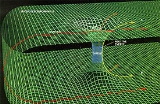What's hapeen actual in twins paradox , how does a person get older and at same interval of time another person not have much age as comared to the taht person
replied to: abhaypratap0101
Replied to: What's hapeen actual in twins paradox , how does a...
That would depend on the form of relativity - either general or special. General would allow you to put one twin near a very, very strongly gravitating body such as near the even horizon of a black hole and leave them there for a length of time. The stronger the gravitational field, the more quickly time passes. Thus, for our twin in orbit around a black hole, time would pass much more quickly in relation to the time for the twin we left on earth. The exact time differential involves mathematics above my ability but let’s say for the sake of this argument that our orbiting twin experiences a ten-fold increase in time passage compared to his earthbound counterpart. This would mean that if he stayed in orbit for one year and then returned to Earth, while he would have aged 1 year, his twin would be ten years older. SIDEBAR: This often makes me wonder how cosmologists correctly date things such as planetary, galaxy, and universal age if time flows differently in different areas of the universe. I believe this is where Special Relativity comes into play however. Einstein said relativity was a bad choice for the theory because the effects of the theory only appear relative to the observer but are actually fixed by the speed of light, hence, what appears to you to be time passing at one rate and another to me, for a photon, frozen in its moment of creation – the equations balance them out. Nonetheless, the effects on the macro world are real. END SIDEBAR. If you’re using special relativity in our twins example – that has to do with time slowing down as travel speeds up. As a particle (twin) travels faster and faster through space-time (remember, they are really one thing), time slows down for him. So if we take our first twin and instead of orbiting him around a super massive black hole we send him hurling through space (let’s leave out the logistics) at say 99.99% the speed of light, we’d get an effect similar to the one like the orbiting twin (again, math way over my head). For arguments sake, the traveler spends six months leaving and six months returning (let assume constant acceleration for simplification) and thus spends 1 year traveling at almost the speed of light. He again, would have aged a year while his twin on earth would be ten years older. I cannot help you with the math but these are the principles. For special relativity it’s actually pretty easy to understand if you look at it this way – the faster you drive your car the faster you get where you’re going. You don’t realize it but time is actually slowing to allow you to arrive at your destination sooner. It is, of course, too small to measure but that’s a simple way to understand what is happening. I hope this helps and you weren’t asking for field equations ;-)
Satori
replied to: Satori2869
Replied to: That would depend on the form of relativity - either general...
I couldn't have said that any better.

